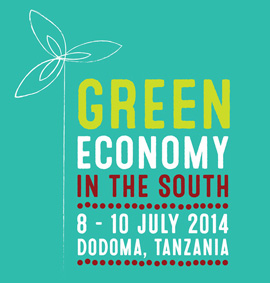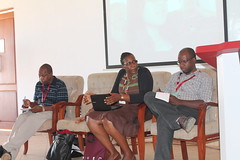by Jessica Pouchet, Ph.D. Candidate, Northwestern University
What happens when a village in Tanzania has carbon to sell, but no one to buy it?
Following a stimulating conference, about a dozen participants visited a village that employs community-based forest management; located in the Manyara region of Tanzania, about a half-day’s drive from the University of Dodoma. There, we met with the village chairman as well as with members of the village natural resources committee in order to learn about their perspectives on forest conservation and the carbon trade.
Discussed at length during the conference, carbon offset schemes like REDD+ are market-based approaches to climate change mitigation. They construe forest conservation in one part of the world (generally the South) as something that can be priced, and then bought by those emitting carbon in another part of the world (the North). Aligning forest conservation with monetary value, proponents argue, will prevent deforestation. Critics, on the other hand, note that inequalities underpin the trade, which reproduces and reinforces political economic divides between the North and the South in emerging “green economies.” They further suggest that a reduction in forest degradation is not enough to offset escalating carbon emissions. And they empirically illustrate that the market is not the only, nor the best, way to value a forest.
People in the village we visited have experienced some of the potential benefits of carbon offset schemes, but also many of the limits. They said a group of residents measures the carbon stock of their forested areas on an annual basis in order to sell it to potential buyers. Recently, however, no one has made an offer.
Carbon profits, if they came through, would be an added benefit to the village forest management practices and a source for funding community initiatives. But as the village chairman told us on our brief visit, the village first decided to pursue forest conservation as a means to prevent soil erosion, well before the promises of carbon trade were made.
Reflecting upon the field trip raises questions that demand further research: If revenue from carbon offset schemes continues to be elusive, how will the village leaders we met change their approach to forest conservation? Will it alter their relationship with other village residents? In what ways does the process of turning village forests into commodities for the North perpetuate inequalities, and transform the relationship between people and land, locally and internationally? To what extent does market-based thinking overlook the unequal timescales of monetary exchange, carbon emissions, and forest growth? And what needs to happen for a green economy in the South to prosper, if the North isn’t there to pay for it?




One Comment
Probably if you could have time to visit more villages you would have discovered the great illusion on the issue of carbon trade, local people are tactically denied to use their resources for little or no payment! It should be noted that African countries contributes negligible amount of green house gases, in economic terms this is very important because the less carbon you produce the more poor you become, yes, consider higher emitters, USA and China they have refused to ratify Kyoto protocol for their economic progress will be impaired! African countries join and ratify blindly to these treaties, sadly enough these big fishes can’t even full fill the little and babish promises! Let’s all advocate equality for every one want a better place to live, both economically and environmentally!
Remember the more we conserve forests, the little land remain for Agriculture, but also we depend on forests to run our livelihood, if you encourage conservation pay enough money not a peanuts!